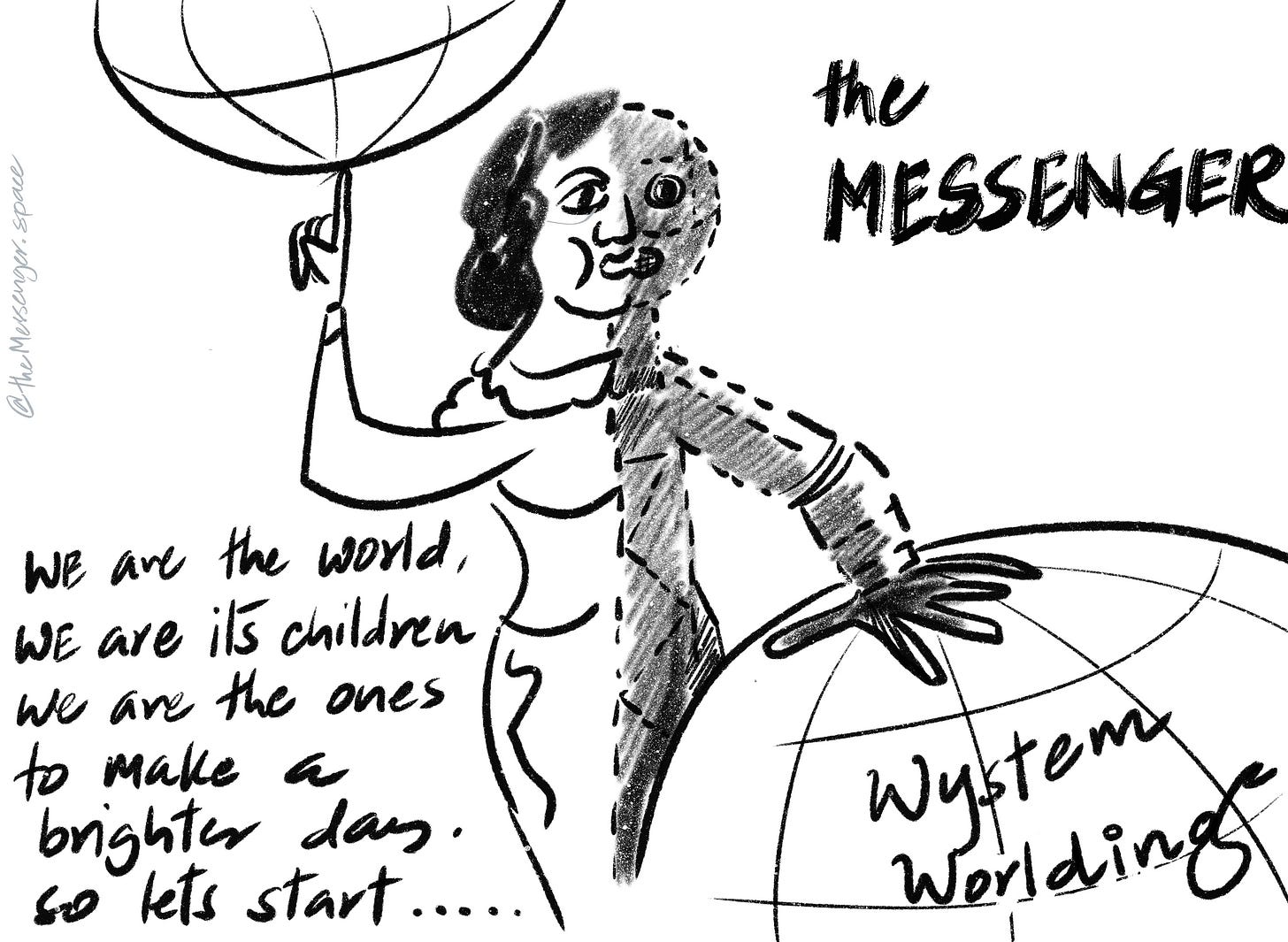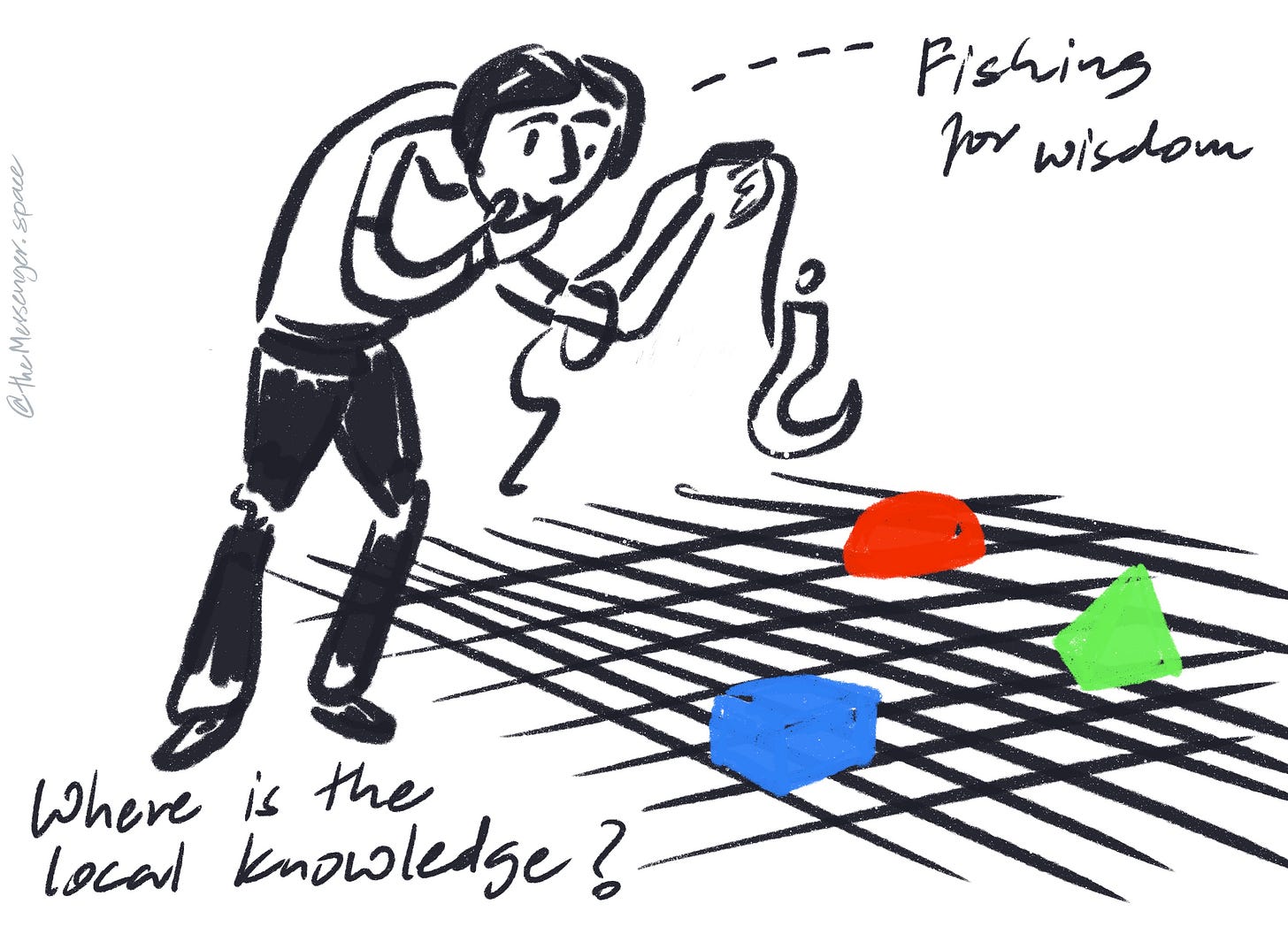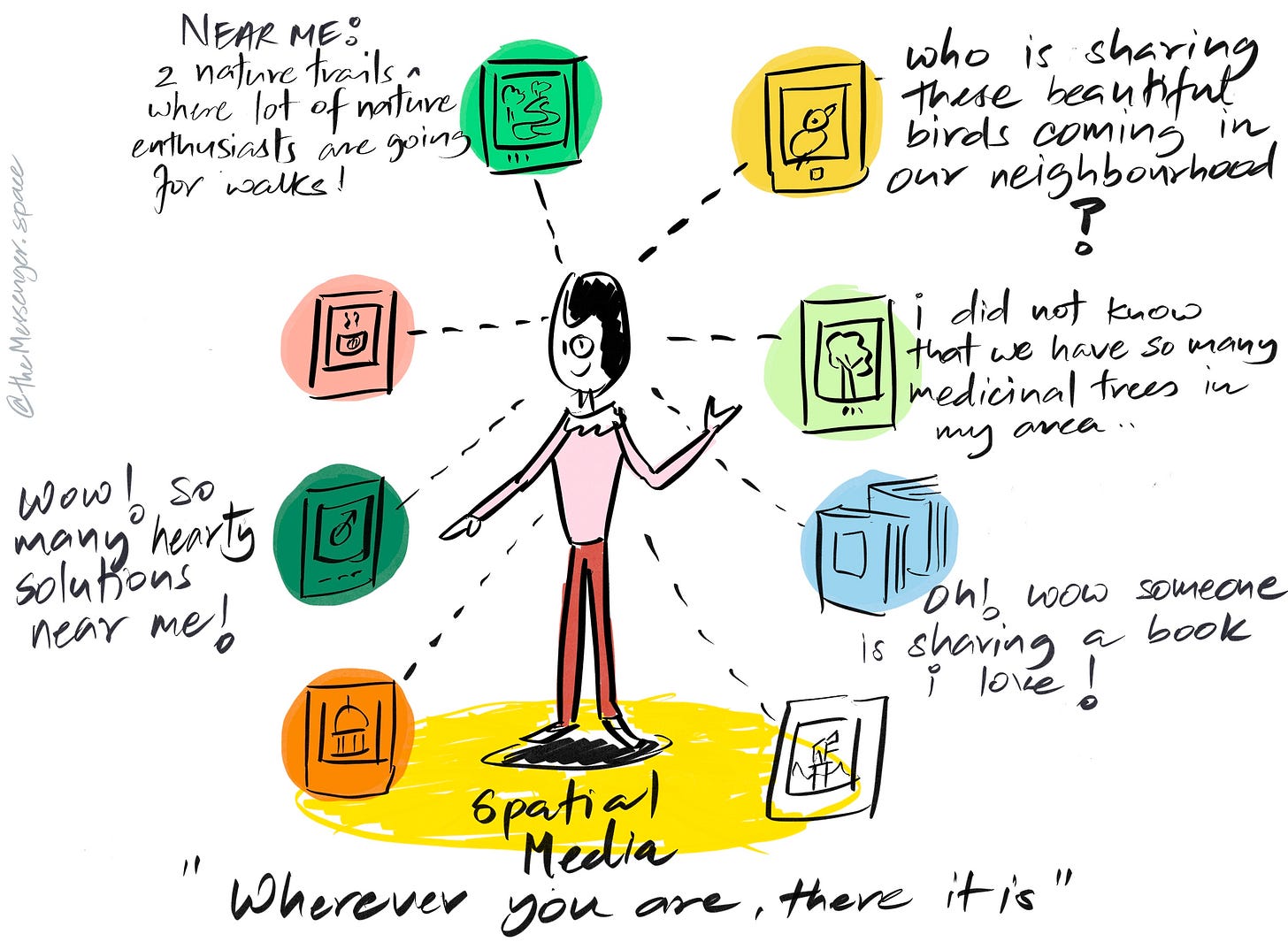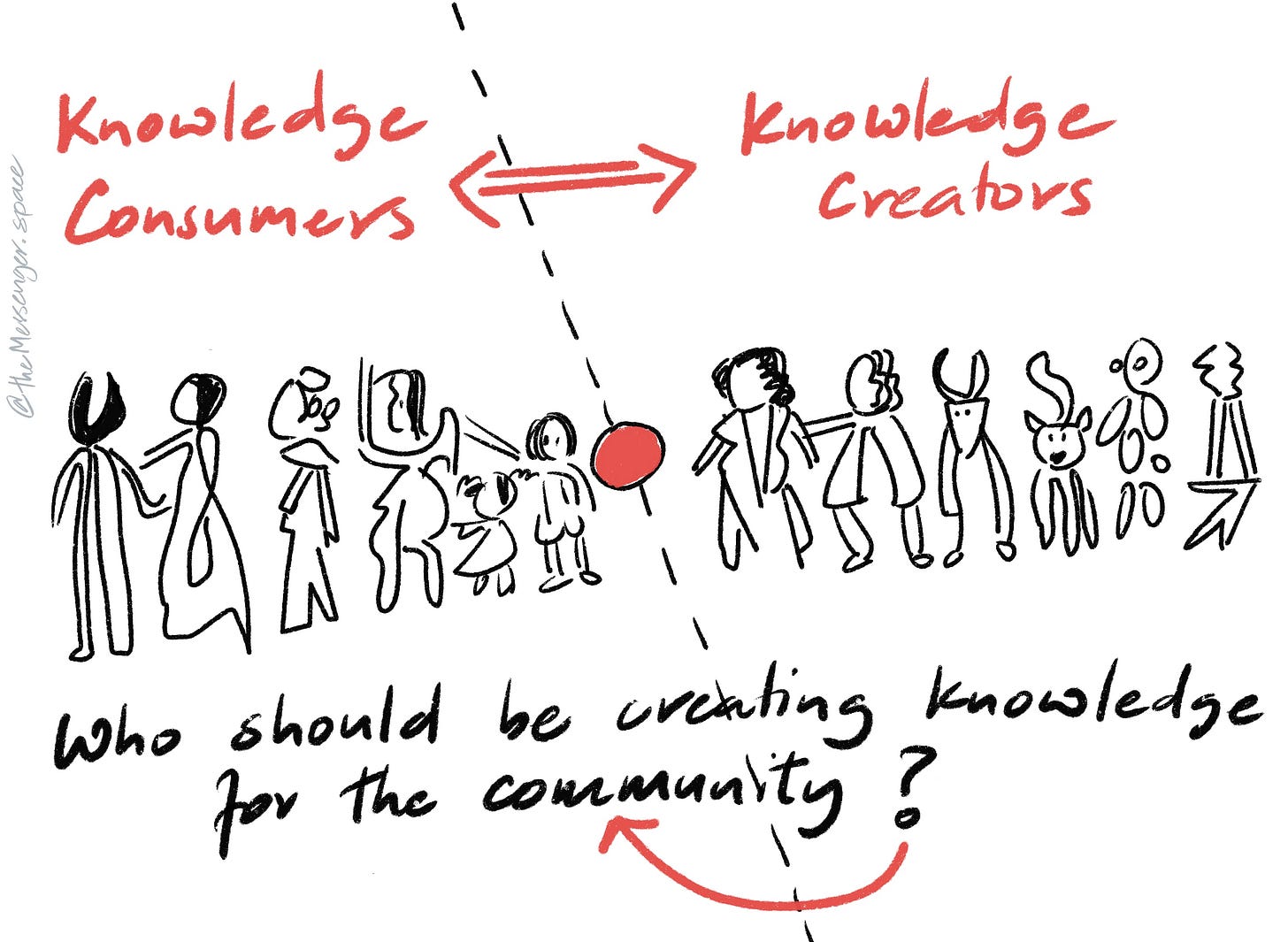Wystems Thinking 2: Wystems Worlding
Local and Global
For much of human history, we were deeply embedded in the environment surrounding us. We knew the places that we lived in intimately. From the biodiversity of our surrounds to the people who lived there, to the soil and climatic and other conditions. Local knowledge was the knowledge everyone possessed. In contrast, we had very little information (note we didn't say knowledge) about places far away from us.
In fact, people had the most outlandish beliefs about far away places. That there are spiders the size of elephants in a country far far away. Today, we're in the exact opposite situation. We have excellent information about the world as such, the world close by as well as far away. But we are alienated from the places we inhabit.
Why one or the other? Why not both? Can't we be embedded in place and also have our awareness extend to the world as such? Can technology play the role of combining the two? At this late stage, with the clock inching towards midnight and with the possibility of life on earth itself in danger, we need to:
1. Think globally and act globally
2. Think globally and act locally
3. Think locally and act globally
4. Think locally and act locally
Remember: AND not OR....
The Knowledge Bridge
This simultaneous need for both local and global awareness points to a fundamental challenge in our information age: how do we create systems that honor and amplify local knowledge while connecting it to global understanding? The Wystems Thinking approach suggests that we need new frameworks for knowledge that are neither purely local nor exclusively global, but rather function as bridges between these scales.
Traditional knowledge systems were deeply embedded in place - passed down through generations, encoded in cultural practices, and intimately tied to specific ecosystems. These systems were remarkably effective at maintaining sustainable relationships between human communities and their local environments. However, they often lacked the ability to scale or adapt quickly to new challenges.
Modern computational systems, on the other hand, excel at processing and distributing global information but often strip away the context and nuance that make local knowledge so valuable. They can tell us everything about global carbon emissions but might miss the traditional ecological knowledge that could help us restore a local watershed.
The solution lies in creating what we might call "scale-bridging knowledge systems" - frameworks that can capture and preserve the richness of local knowledge while making it accessible and relevant at broader scales. These systems would need to be:
Contextual: maintaining the deep connection to place that characterizes traditional knowledge
Connective: linking similar insights and practices across different locations
Cumulative: building upon both local wisdom and global scientific understanding
Collaborative: enabling communities to share and adapt knowledge across scales
This is where technology, properly conceived and implemented, can play a crucial role. Not as a replacement for local knowledge, but as a medium through which different scales of knowing can interact and enhance each other. The challenge is to design systems that don't just collect and store information, but actually help us think and act across scales - from the neighborhood to the planet, from traditional wisdom to cutting-edge science.
This brings us to a practical question: How do we make such knowledge systems accessible and useful to people in their daily lives? How do we ensure that the wealth of information - both local and global - becomes actionable knowledge that helps communities thrive?
Local Open Knowledge Access
Knowledge about our environment, things around us, people’s stories of a place, various efforts going on in any area or neighbourhoods etc do exist, but they are embedded inside different sites and experiences. That makes it cumbersome and difficult to engage with, in an easy, helpful way to make it fulfilling to interact with people, knowledge, data and issues.
Moreover data, stories, images, information, issues, content all exist in various dimensions. One has to crawl through different websites, apps, or ask friends to find interesting things about a place and interact or participate in it. There is no recall or memory to follow up with an action that can help other people or help oneself.
What if information, knowledge, stories could appear around us? An easy simple way for people to discover and exchange place based knowledge. A simple way for like minded groups to mark their meeting points and for people to discover, join. Ways for people to take positive community action.
LOKA is a platform to create/organize/store/consume location specific and contextual data.
Bridging Worlds Through Wystems
The path forward requires us to reimagine our relationship with both knowledge and place. We need systems that can bridge the intimate understanding of our local environments with the broader awareness of global patterns and challenges. This isn't just about building better databases or more user-friendly apps - it's about creating new ways of knowing that honor both the depth of traditional wisdom and the breadth of modern scientific understanding.
Wystems Thinking offers us a framework for this integration. By treating knowledge as something that flows between scales - from the hyperlocal to the planetary - we can begin to design technologies that serve as connective tissue between different ways of knowing and being. These systems wouldn't just store information; they would help us understand the relationships between things, the patterns that connect our local actions to global outcomes, and the ways our communities are embedded in larger ecological and social networks.
The challenge ahead is both technical and cultural. We need to build systems that are sophisticated enough to handle complex, interconnected information, yet simple enough to become part of daily life. More importantly, we need to foster a culture that values both local and global knowledge, that sees the wisdom in traditional practices while embracing the possibilities of new technologies.
As we face unprecedented global challenges, from climate change to social inequality, this integration of local and global understanding becomes not just desirable but essential. The future of human flourishing depends on our ability to act wisely at all scales - to think and act both locally and globally, to use technology not as a replacement for human wisdom but as a tool for amplifying and connecting it. This is the promise of Wystems Thinking: a way to bridge worlds, connect knowledge systems, and create the conditions for sustainable, thriving communities at all scales.












